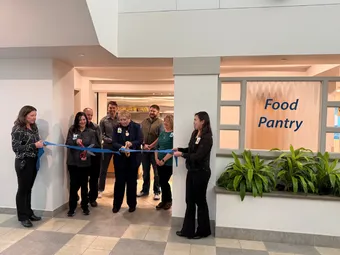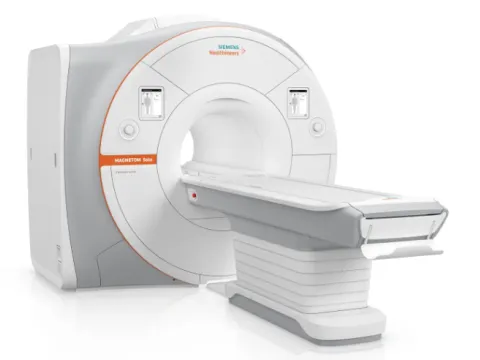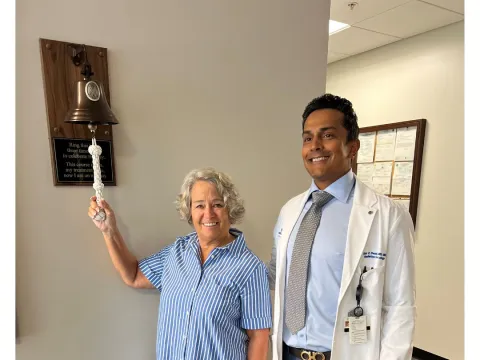- AdventHealth

Sepsis, also referred to as "blood poisoning," is a life-threatening condition that arises as a severe response to an infection already present in the body. It can lead to organ failure, tissue damage and even death if not promptly treated. Recognizing the symptoms of sepsis and taking immediate action is crucial in saving lives.
More than 1.7 million[1] people are diagnosed with sepsis each year in the US, and sepsis remains the most common cause of hospitalization both nationwide and at AdventHealth hospitals in Georgia. Even more concerning, sepsis remains the cause of death in about a third of hospitalizations, many of which could have been prevented with earlier intervention, said AdventHealth Gordon Chief Hospitalist Daniel Treiyer, MD.
“We see sepsis almost every day in the hospital, and it's one of the most rewarding diseases we manage because if people come in in time and get the emergency treatment for it, it tends to get better,” said Dr. Treiyer. “The problem is people delay coming in and don't recognize the signs and symptoms of sepsis. Many people have heard about sepsis but may not put some of the symptoms they have together with the term ‘sepsis.’”
According to the Sepsis Alliance and sepsis.org, upwards of 87%[2] of sepsis cases occur in the community and the longer a patient waits to seek help, the higher the risk of severe damage and in some cases, death. Time really does matter.
Joseph Joyave, MD, chief medical officer of AdventHealth Gordon and AdventHealth Murray seeks to educate the community about this condition in order to save lives throughout Northwest Georgia. Recent data revealed a high number of middle aged, working men tend to have worse outcomes or complications due to sepsis at AdventHealth Gordon and AdventHealth Murray.
“Barriers such as concerns about work, cost or male bravado may be causing delays in seeking medical attention,” said Dr. Joyave. “Our medical community is dedicated to elevating sepsis to the same level of urgency as chest pain and stroke symptoms.”
Sepsis Symptoms
Sepsis can manifest through various symptoms, and it is important to be vigilant. Sepsis can begin after any type of infection, that you already have, such as in your skin, lungs, urinary tract, a wound or somewhere else. If you or someone you know experiences one or a combination of the following signs, it is essential to seek immediate medical attention at your nearest emergency department:
- Confusion or disorientation
- Shortness of breath
- High heart rate
- Fever, shivering or feeling excessively cold
- Extreme pain or discomfort
- Clammy or sweaty skin
Who is at Higher Risk?
Although anyone can develop sepsis, certain populations are more commonly affected. Understanding the higher-risk groups can help identify individuals who may be more susceptible to sepsis:
- Adults aged 65 or older
- Individuals with chronic conditions such as diabetes, lung disease, cancer and kidney disease
- People with weakened immune systems
- Children younger than one year old
The Urgency of Taking Action
Recognizing the signs of sepsis is only the first step. It is crucial to act swiftly and seek medical help if sepsis is suspected. Delaying or avoiding medical intervention can lead to severe complications. Timely treatment can make a significant difference in saving lives.
“We feel a significant effort should be made in recognition of the signs and symptoms to promote earlier presentation and recognition. These efforts should result in shorter hospital stays and more rapid return to normal life activities,” said Dr. Joyave.
Sepsis is a medical emergency that requires immediate treatment at an emergency department. If you suspect sepsis or have an infection that is not improving or getting worse, do not hesitate to act. To ensure the best outcomes, it is crucial to seek medical assistance at your nearest emergency department immediately if sepsis is suspected. Remember, sepsis is a medical emergency, and timely intervention can make a significant difference in saving lives. Together, let us prioritize early recognition and empower our community to take swift action against sepsis.
[1] Hall, MJ, et al. “Inpatient Care for Septicemia or Sepsis: A Challenge for Patients and Hospitals.” NCHS Data Brief, No 62. Hyattsville, MD: National Center for Health Statistics. 2011. https://www.cdc.gov/nchs/data/databriefs/db62.pd
[2] Rhee C, et al. “Incidence and Trends of Sepsis in US Hospitals Using Clinical vs Claims Data, 2009-2014.” JAMA. 2017;318(13):1241-1249. http://jamanetwork.com/journals/jama/fullarticle/2654187
Choose the health content that’s right for you, and get it delivered right in your inbox.
Recent News

AdventHealth Avista opens food pantry to support community health
AdventHealth Avista has taken a significant step toward addressing food insecurity, a key priority identified in its Community Health Needs Assessment by opening a food pantry on its first floor. This...

AdventHealth Porter Earns COPPER Designation, Strengthening Pediatric Emergency Care
AdventHealth Porter is proud to announce that its Emergency Department has earned the Pediatric Advanced COPPER designation, a significant milestone that reflects a deep commitment to providing safe...

Three AdventHealth hospitals in Florida’s Volusia and Flagler counties earn top Leapfrog honors
Residents of Volusia and Flagler counties now have national confirmation of something many rely on every day: safe, high-quality hospital care close to home.

AdventHealth DeLand investing in next-generation MRI technology to enhance patient care
AdventHealth DeLand will soon install a new MRI system designed to deliver faster exams, sharper images and a more comfortable experience for patients in West Volusia.

AdventHealth Wauchula earns 2025 Leapfrog Top Rural Hospital Award for outstanding quality and safety
People in Hardee County can feel confident knowing their local hospital is among the safest in the nation with AdventHealth Wauchula being named a Top Rural Hospital by The Leapfrog Group for its...

Innovative new procedure offers hope for heart transplant candidates at high risk for rejection
Innovation at AdventHealth is driven by one purpose: helping people heal in body, mind and spirit.

NC Supreme Court clears way for first phase of AdventHealth’s new hospital in Weaverville
AdventHealth is grateful for community support as NC Supreme Court decision clears the way for a new hospital.

The hidden cancer one clinician caught – and the process improvements she says matter most
Shana Vongkhankeo, APRN, discovered an unusual thyroid enlargement during a routine physical for a teenage patient, leading to a life-saving cancer diagnosis that highlighted how being fully present...

AdventHealth debuts first-of-its-kind Performer Health Program in Central Florida
AdventHealth is launching the Performer Health Program, a first-of-its-kind initiative in Central Florida focused on addressing the unique health needs of artists and performers.

AdventHealth named among U.S. News & World Report’s fifth annual 2026 Best Hospitals for Maternity Care
This marks the third year in a row AdventHealth Shawnee Mission has appeared on the U.S. News & World Report’s list of Best Hospitals for Maternity Care.

AdventHealth Waterman strengthens access to expert specialty care with expansion of Mount Dora medical plaza
Second floor buildout adds orthopedics, sports medicine, women’s health and heart care for Lake County.

Expanding hope through innovation: AdventHealth advances cancer care across East Florida
Cancer touches nearly every family, and in Flagler, Lake and Volusia counties, the demand for timely, advanced care keeps rising. AdventHealth’s East Florida Division, which includes seven hospitals...
